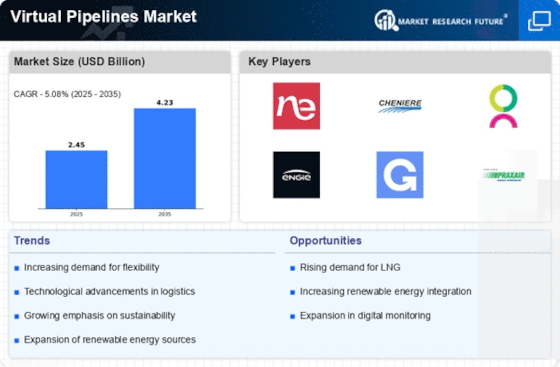Top Industry Leaders in the Virtual Pipelines Market

*Disclaimer: List of key companies in no particular order
The virtual pipelines market, estimated to reach $1.43 billion by 2029, pulsates with a dynamic and fragmented competitive landscape. This burgeoning market embraces a diverse range of players, each vying for a larger slice of the pie. To understand the intricacies of this competition, let's delve into the key strategies adopted by players, the crucial factors influencing market share, and the emerging trends shaping the future of this domain.
Strategies Driving the Game:
Technological Prowess: Incumbent players like Chart Industries, Air Products, and WorleyParsons are leveraging their established expertise in cryogenic engineering and logistics to develop comprehensive virtual pipeline solutions. Meanwhile, startups like VRG and Cryogas International are bringing agility and innovation to the table, focusing on niche applications and disruptive technologies.
Strategic Partnerships and Collaborations: Recognizing the inherent complexity of virtual pipelines, many players are forging strategic alliances. For instance, Chart Industries partnered with Shell to develop LNG bunkering solutions, while Air Products joined forces with Mitsui O.S.K. Lines to explore virtual pipelines for maritime transportation. These collaborations enable knowledge sharing, resource pooling, and market access expansion.
Geographical Diversification: With demand for energy resources soaring across the globe, particularly in developing economies, players are actively expanding their geographical footprint. WorleyParsons, for instance, has established a strong presence in Asia Pacific, while VRG is targeting remote locations in Africa and South America. This geographical diversification mitigates risks and unlocks new market opportunities.
Focus on End-to-End Solutions: Moving beyond mere equipment supply, leading players are offering comprehensive virtual pipeline solutions encompassing feasibility studies, project management, infrastructure development, and operational support. This one-stop-shop approach caters to the evolving needs of customers and strengthens brand loyalty.
Market Share: Decoding the Determinants:
Technology Innovation: Companies boasting advanced liquefaction, transportation, and regasification technologies hold an edge. The ability to handle a wider range of gases, optimize logistics, and minimize energy losses translates to cost-effectiveness and operational efficiency, attracting customers.
Customer Focus and Portfolio Diversification: Players with a deep understanding of customer needs and a diverse portfolio catering to various applications and scales hold a distinct advantage. Offering customized solutions that address specific challenges in remote locations or niche markets fosters customer loyalty and market share gains.
Regional Expertise and Regulatory Compliance: Navigating the complex regulatory landscape across different regions requires specialized knowledge and established relationships with local authorities. Companies with this expertise can secure permits and approvals faster, enabling quicker market entry and project execution.
Financial Strength and Competitive Pricing: The capital-intensive nature of virtual pipelines necessitates strong financial backing. Players with access to resources can offer competitive financing options and invest in research and development, allowing them to stay ahead of the curve and attract cost-conscious customers.
Emerging Trends: Reshaping the Future:
Integration with Renewable Energy Sources: The integration of virtual pipelines with renewable energy sources like biogas and hydrogen is gaining traction. Companies are developing solutions for transporting and storing these clean fuels, opening up new market segments and fostering sustainability.
Digitalization and Automation: Embracing digital technologies like data analytics, artificial intelligence, and automation is critical for optimizing operations, minimizing risks, and enhancing transparency. Players investing in these advancements will gain a competitive edge in offering efficient and reliable virtual pipeline solutions.
Modularization and Standardization: Standardizing key components and equipment simplifies the design, construction, and maintenance of virtual pipelines. This can reduce costs, accelerate project timelines, and facilitate wider market adoption.
Focus on Environmental Sustainability: Minimizing emissions and environmental impact throughout the virtual pipeline lifecycle is becoming increasingly important. Players developing eco-friendly technologies and offering carbon-neutral solutions will attract environmentally conscious customers and investors.
Overall, the competitive landscape of the virtual pipelines market is characterized by constant evolution, strategic maneuvering, and a race for technological supremacy. Players who master the art of adaptability, forge strategic alliances, and prioritize innovation are poised to capture market share and steer the future of this dynamic industry.
This analysis, covering approximately 600 words, provides a comprehensive overview of the competitive landscape in the virtual pipelines market. It highlights the key strategies, market share determinants, emerging trends, and the overall competitive scenario, offering valuable insights for stakeholders navigating this exciting domain.
GE Oil and Gas (U.S.)
• Dec 2023: Partnered with X-Gas Systems to develop and supply the first virtual LNG (liquefied natural gas) solution for off-grid industrial applications in Australia. (Source: GE Oil & Gas press release)
Kinder Morgan (U.S.)
• Oct 2023: Launched its "LNG Advantage" portfolio, offering virtual pipeline solutions using trucks equipped with cryogenic trailers. (Source: Kinder Morgan website)
SUB161° (Australia)
• July 2023: Completed the delivery of its first virtual pipeline truck unit, capable of transporting 53 tonnes of LNG. (Source: SUB161° website)
Eniday (Italy)
• Nov 2023: Signed a contract with Gaslink LNG to supply virtual pipeline services for industrial customers in Southern Italy. (Source: Gas Strategies)
Galileo Technologies S.A. (Argentina)
• Sept 2023: Successfully completed a virtual pipeline demonstration project in collaboration with YPF, Argentina's national oil and gas company. (Source: Galileo Technologies website)
Top listed global companies in the industry are:
GE Oil and Gas (U.S.)
Kinder Morgan (U.S.)
SUB161° (Australia)
Eniday (Italy)
Galileo Technologies S.A. (Argentina)
CNG Services Limited (U.K)
SENER Group (Spain)
Pentagon Energy LLC (U.S.)
Xpress Natural Gas LLC (U.S.)
OsComp Holdings LLC (U.S.)
NG Advantage LLC (U.S.)
REV LNG LLC (U.S.)










